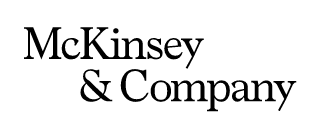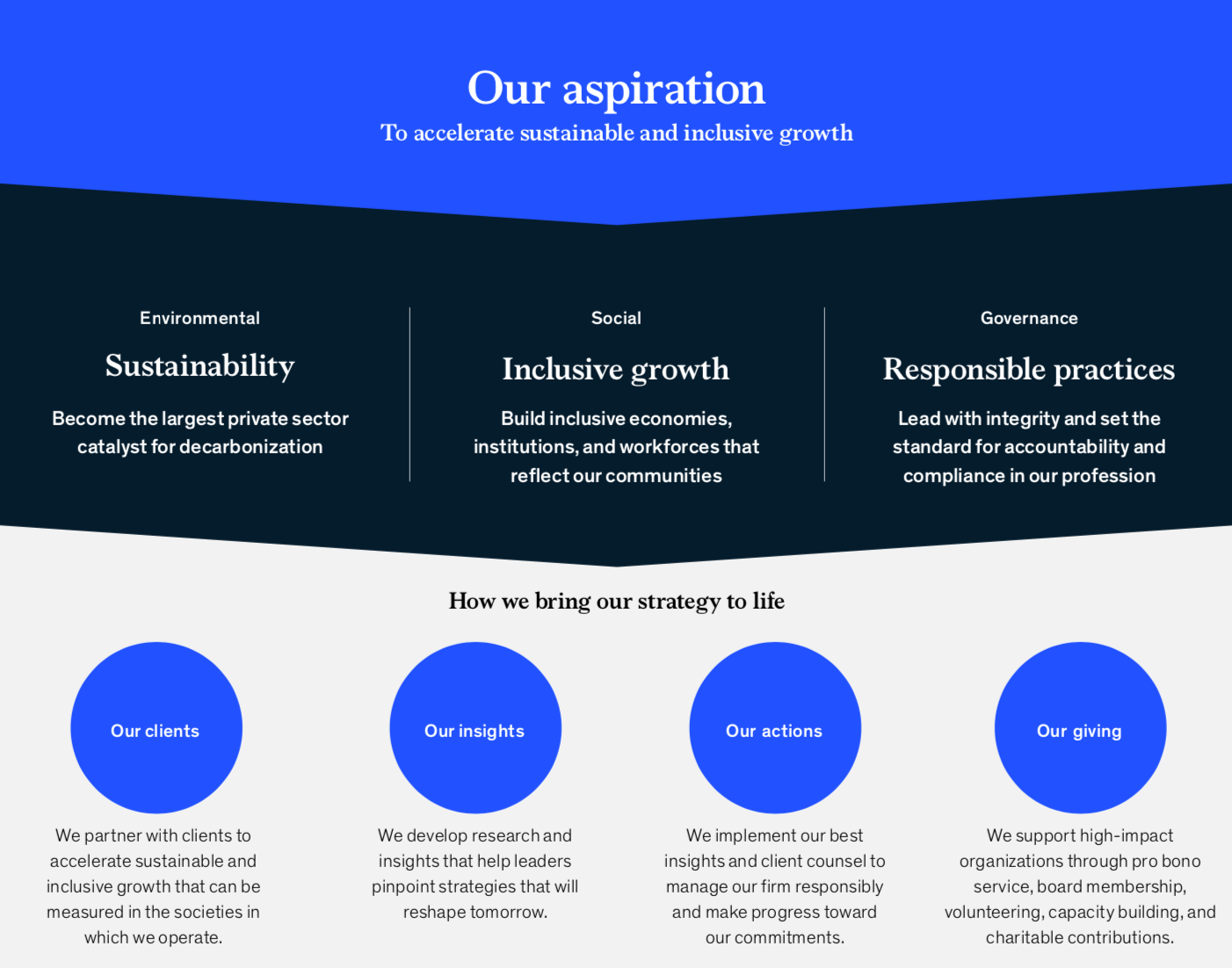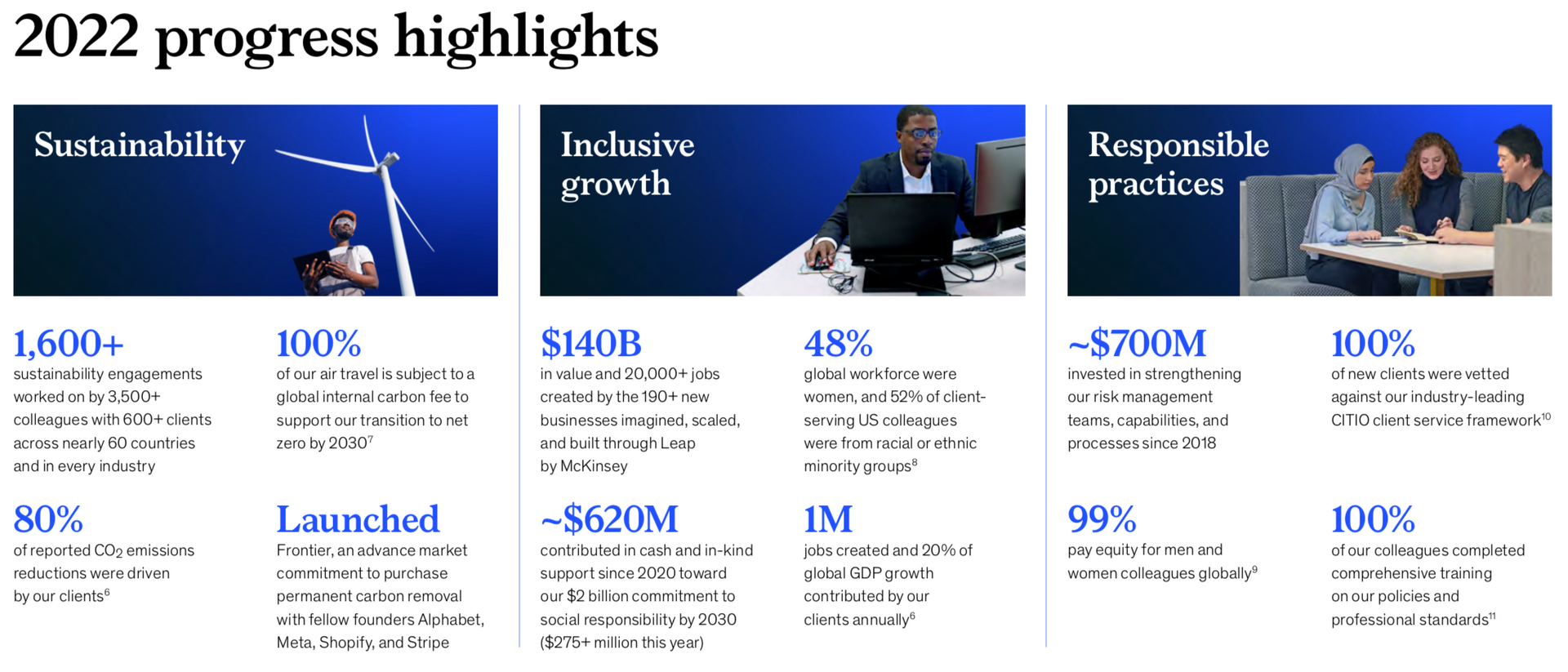CEF Lead Executives
-
ISABELLE SCHUHMANNItem Link
CEFNext
Global Director, Environmental Sustainability
Isabelle is responsible for defining and managing McKinsey & Company’s strategies to meet its environmental commitments and aspirations (incl. near-term Science-Based-Targets, net zero, carbon neutrality).This includes internal education and behavior changes as well as external engagement both in alliances as well as procurement (such as carbon credits, SAF, EACs). Isabelle is passionate about advancing new ways to decarbonize our planet and empowering colleagues to drive local and global change. She earned a Diploma in Psychology and a BSc in Ecomics from Munich’s Ludwig-Maximilians-University and a MBA from Berkeley-Haas. Isabelle spent >6 years serving clients incl. on clean energy and transportation. In her free time, Isabelle used to be found outdoors – hiking, skiing, road biking and more – but w she has two little kids ;)
-
CAMERON KENNEDYItem Link
Director of Global Social Responsibility
-
JOP WETERINGSItem Link List Item 1
Expert Associate Partner
From 2018-2021, as McKinsey’s Director of Environmental Sustainability, Jop led the firm’s efforts to address its own global environmental footprint. As part of this role, he helped launch the LEAF Coalition in April 2021 and spearheaded McKinsey’s involvement as a founding member of the Sustainable Aviation Buyer Alliance (SABA) and the NCS Investment Accelerator, at COP26 in Glasgow (Nov 2021). In January 2022, Jop transitioned into a client-service role with McKinsey Sustainability, in which he focuses on (voluntary) carbon markets, natural climate solutions, and science-based target setting for near-term emission reductions and net-zero. He continues to represent McKinsey at the World Business Council for Sustainable Development (WBCSD) and the Natural Climate Solutions Alliance (co-convened by the World Economic Forum and WBCSD).
-
KRISTEN JENNINGSItem Link
Global Director of External Relations
Kristin leads communications globally for McKinsey's Sustainability Practice, planning and implementing a strategy for publishing, events, media relations, and internal communications. Previously at McKinsey, she was the head of global external relations for the Public and Social Sector Practice. Prior to McKinsey, Kristin spent 5 years working in nonprofit communications, leading marketing and media relations for the Clinton Foundation, the Clinton Global Initiative, and iMentor. She began her career in book publishing as a nonfiction editor at Penguin. In total, Kristin has spent more than 15 years developing integrated communications programs for traditional media, online and social media channels, and global events that leverage strategic partnerships, engage stakeholders, and inform key audiences.
-
DAVID BODARKYItem Link
Director of Purchasing
David is the Director of Global Purchasing Operations based in both Florida and New York. A procurement professional with over fifteen years of experience, David has in depth knowledge of strategic sourcing, contract management, purchasing systems, commercial card programs, and purchasing operations. David, along with the CPO, is responsible for creating the strategic vision and direction for Optimize, the McKinsey function that delivers distinctive, positive and productive experiences–with services ranging from travel, events, real estate and sourcing to support including technology and purchasing. David is also responsible for providing effective and inspiring leadership to his senior level team to set plans and execute on the strategy. Prior to joining McKinsey, David worked as a buyer at the Metropolitan Museum of Art, where he managed the purchasing card program and was responsible for sourcing several commodities (e.g. hardware, software, support services, etc.). David holds a BBA in Operations Management from CUNY Baruch College.
-
AZIZA AKHATOVAItem Link
Manager, ESG
Aziza has been with McKinsey & Co. for almost two years. Previously, Aziza was the Head of ESG Program at software developer Ansys. Before that, Aziza spent over four years at Johnson & Johnson managing ESG strategy, reporting and engagement. Aziza has also held roles at the UN Industrial Development Organization (UNIDO), United Nations Development Programme (UNDP), World Bank Group, and the International Union for Conservation of Nature (IUCN). Aziza has a BA in International Relations from The University of World Economy and Diplomacy, an MSc in Environmental Governance from The University of Freiburg and an MSc in Environmental Technology, with a concentration in Environmental Economics and Policy from Imperial College London.
-
SHALLY VENUGOPALItem Link
Principal, Vivid Economics North America
Shally leads Vivid Economics North America office and works with private and public sector clients on climate and nature risk, net zero ambition, and stakeholder engagement. Prior to McKinsey & Co. Shally served as Acting CEO of Concordian LLC, and founded and led Myolo, a pioneering fintech startup, and was named one of the Top 40 Power Women of DC Tech. Before Myolo, Shally led the private sector climate finance team at the World Resources Institute to help drive the incorporation of climate risks and opportunities into business decision making, and to create innovative financing instruments to leverage private capital. Shally started her career in Morgan Stanley’s public finance banking division. Her past work has spanned the finance, buildings, food and beverage, chemicals, and energy sectors. She graduated from The Wharton School at the University of Pennsylvania with a Bachelor of Science in Finance (Finance and Real Estate concentrations) and a minor in Mathematics.
Sustainability Goals
Sustainability Goals
2025 Goals
- 100% renewable electricity as part of its RE100 commitment (reached 95% renewable electricity as of 2020)
2030 Goals
- Reduce Scope 1 and 2 GHG emissions by 60% (compared to 2017 levels) (Scope 1 and Scope 2 emissions reduced by 18% as of 2020)
- Invest $2 billion in cash or in-kind support to social responsibility efforts ($150 million invested as of 2020)
- Participate in 10 actions to improve racial equity:
- Double Black leadership and hiring Black colleagues over 4 years
- Establish a Black economic institute
- Donate $200 million in pro bono work
2050 Goals
- Reduce Scope 1 and 2 GHG emissions by 90% (compared to 2017 levels).
Latest Sustainability Reporting
(June 2023)
Highlights
- In 2022, 3,500 of McKinsey colleagues worked on more than 1,600 sustainability engagements with 600 clients across nearly 60 countries and in every industry.
- 30% reduction in absolute Scope 1 and 2 emissions in 2022 (2019 baseline).
- 48% reduction in Scope 3 emissions from “travel per colleague” in 2022 (2019 baseline).
- 97% renewable energy in 2022 (toward goal of 100% by 2025).
- Introduced an internal carbon fee on all air travel to accelerate decarbonization and generate funding for carbon reduction efforts.
- Committed $2 billion to social responsibility efforts by 2030 and has so far contributed nearly $620 million in cash and in-kind support toward that commitment (including more than $275 million in 2022).
- In 2022, McKinsey joined the Enduring Earth initiative, a collaboration to accelerate ocean, land, and freshwater conservation and support community development worldwide.
- Engaged more than 67,000 Black, Asian, Hispanic, and Latino professionals in McKinsey’s Connected Leaders Academy and published 30 insight pieces through the newly established McKinsey Institute for Black Economic Mobility.
- 99% pay equity for men and women employees globally.
- In 2022, McKinsey’s global workforce was 48% women, and 47% of U.S. workforce were from racial or ethnic minority groups.
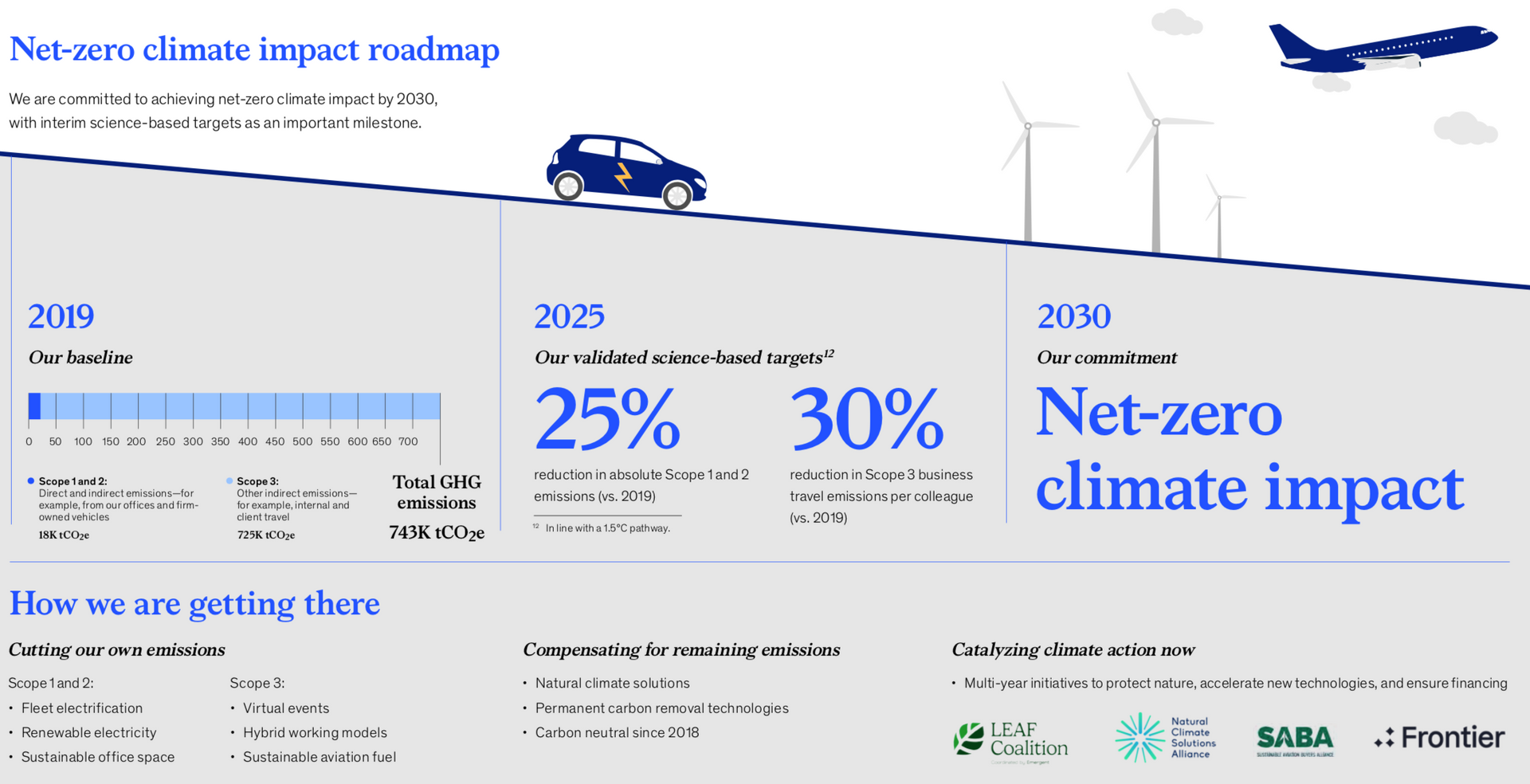
Recent News
2023
Smart Freight Centre (SFC) Exchange Network — Published a Proof of Concept (PoC) Evaluation Report, a first step in establishing the SFC Exchange Network to promote data sharing between transport value chain actors and increase carbon transparency. The report assessed three key criteria: the feasibility of technical implementation, peer-to-peer data exchange, and willingness to share data. It also explored options for future governance and assurance frameworks. The results show the need for future efforts in the industry and the PoC “provided a momentum and promising results to continue towards a full build.” CEF members Amazon and Dow are participants and contributors, and CEF member McKinsey is a knowledge partner. (Aug 2023)
Airports of Tomorrow — This initiative, launched by World Economic Forum with Airports Council International, aims to overhaul global airports to enable net-zero aviation. It brings together more than 50 CEOs from “the aviation ecosystem” to mobilize capital needed to transform airports into clean energy hubs, electrify airport operations, and scale up at least 300 Sustainable Aviation Fuel plants by 2030. CEF members include Bank of America, Boeing, Honeywell, and McKinsey & Co. (July 2023)
FRONTIER — Facilitated a set of offtake agreements with Charm Industrial. This $53 million deal will sequester 112,000 tons of CO2 from the atmosphere between 2024 and 2030, storing it underground. Charm collects waste biomass from agriculture or forest management and, through pyrolysis, converts it into a bio-oil that will be injected permanently into regulated wells. The amount contracted is about ten times the amount of permanent atmospheric removal worldwide thus far and about 18 times more than Charm has sequestered to date via pilot processes. (May 2023)
The Open for Business Coalition, made up of 34 global companies, denounced anti-LGBTQ legislation passed by Uganda's parliament last week, warning it would curb investment flows, deter tourists, undermine companies’ ability to hire a diverse workforce, and damage the country's economy. The legislation criminalizes identifying as gay, lesbian, bisexual, transgender or queer, and imposes the death penalty for “aggravated homosexuality.” The coalition includes CEF members Dow, Google, JP Morgan Chase, Mastercard, McKinsey & Co., Meta, Microsoft, and Unilever. (April 2023)
Giving to Amplify Earth Action (GAEA) (World Economic Forum) — This new initiative, supported by more than 45 major philanthropic, public, and private sector partners, will leverage philanthropic capital to help generate the $3 trillion needed each year to reach net zero emissions and reverse nature loss. Over the next 12 months, supported by CEF member McKinsey Sustainability as a knowledge partner, GAEA will work with founding members to build momentum around three objectives: convening leaders to identify and target climate and nature solutions where they are best positioned to play a catalytic role; pilot and refine funding models; and scale up and replicate successful approaches to new sectors, regions, and actors. (Jan 2023)
2022
RUBICON CARBON — Launched as a new carbon credit platform to scale and provide easier access to high-integrity emissions reduction solutions by vetting projects and their credits. Rubicon received an initial capital commitment of $300 million from CEF member TPG, with a total capital commitment target of $1 billion. As part of its launch, Rubicon also formed a coalition of corporate sustainability leaders to help guide its platform and product development, including CEF members Bank of America, Dow, GE, Honeywell, J.P. Morgan, JetBlue, McKinsey & Co., and TD Bank. (Dec 2022)
Launched the Net Zero Built Environment Council, a coalition of industry leaders working to reduce operational emissions from existing building stocks and to design solutions to decarbonize the built environment. The council will work to increase transparency and awareness, develop partnerships along the value chain, and create consistent and reliable sustainability metrics. (Nov 2022)
More than 330 businesses and financial institutions from 52 countries, with combined revenues of over $1.5 trillion, urged world leaders to move beyond voluntary actions to halt and reverse biodiversity loss in a new statement. The statement advocates for the leaders to adopt “mandatory requirements for all large businesses and financial institutions to assess and disclose their impacts and dependencies on nature by 2030.” CEF Members involved include BASF, Google, International Paper, McKinsey & Co., Microsoft, PepsiCo, Procter & Gamble, Schneider Electric, Tiffany & Co., Unilever, and WM. Businesses can sign the statement here. (Oct 2022)
Launched a new Sustainability Academy to help client organizations better train their personnel for the net zero transition. The academy currently includes two programs, an Executive Masterclass for senior executives to gain the skills needed to achieve their sustainability agendas, and a Sustainability Transformation Essentials, which helps clients develop enterprise-wide awareness of core sustainability concepts. (Oct 2022)
MCKINSEY / MICROSOFT — Are collaborating to create an integrated solution that combines sustainability data intelligence from Microsoft Sustainability Manager with decarbonization planning and an execution engine from McKinsey Sustainability’s Catalyst Zero. This joint product will integrate data from emissions producing activities with initiatives to abate them, utilizing data from across more than 70 industry sectors. (Sept 2022)
Race in the workplace: The frontline experience (McKinsey & Company) — Explores how frontline employees of color face specific challenges related to workplace experience and advancement, and what companies can do to support them. Frontline workers, despite being the largest and most diverse part of the workforce, have not benefited adequately from corporate DEI initiatives, the report finds. Frontline hourly workers, in particular, are 20% less likely than corporate employees to believe that their companies’ DEI policies are effective, with Black employees feeling least enfranchised among them. The report offers steps companies could take to improve job quality and better support frontline workers of color to develop and progress in their careers, including (Aug 2022):
- Create platforms that give frontline workers a greater voice in the company’s decision-making.
- Expand benefits to “raise the floor” for frontline workers. Include offerings like mental health support, greater flexibility in the workplace, improved transparency and predictability in scheduling, and stock ownership plans to promote wealth creation.
- Overhaul the talent management system, including the creation of individual development plans.
- Formalize paths for advancement, including the identification of “gateway jobs” within the company, and ensure that the necessary mentorship and skills-development opportunities are in place.
FRONTIER — Carbon removal funding venture Frontier has announced its initial spend of $2.4 million, facilitated on behalf of funding partner Stripe, to be allocated among six carbon removal startups. The Frontier Fund, with a current total of $924 million from Alphabet, CEF members Meta and McKinsey & Co., Shopify, and Stripe, was established as an advance market commitment (AMC) guaranteeing future sales for companies working to develop carbon removal technologies and scale operations. Frontier is the first customer for each of the six companies selected, and another round of funding to additional recipients is planned for the fall. (July 2022)
Navigating America’s Net-Zero Frontier: A Guide for Business Leaders (McKinsey & Company) — Provides guidance for business leaders to create effective strategies for achieving net-zero commitments within the context of the United States government’s goal to reach net-zero emissions by 2050. Authors encourage leaders to imagine “where their business would stand in a net-zero economy” that favors low-emissions goods and services, and how they could realize opportunities by “overhauling” their business models, including portfolio transformation, green business building, premiums on green attributes, and decarbonized operations. The analysis (May 2022):
- Maps emission sources and models a pathway for the U.S. to address its 7.2 billion metric tons of annual GHG emissions, including retrofitting facilities and infrastructure, decarbonizing transportation, and replacing 60% of the natural gas now in use with zero-carbon energy sources.
- Suggests that “transformation of every sector” will be required for the U.S. to meet a 1.5C scenario and highlights five climate solutions with enormous potential for both emissions abatement and economic growth through 2025: renewable power, electrification, operational efficiency, clean fuels, and carbon capture.
- Describes macro trends to help companies anticipate risks and opportunities, such as the accelerating deployment of tech and infrastructure to enable climate solutions, and declining costs that suggest “organizations could presently abate some 40 percent of US GHG emissions at no net additional cost.”
Design For Good — A new global nonprofit alliance of companies and institutions committed to harnessing the power of their design communities to advance the UN Sustainable Development Goals. Founding partners—which include CEF members McKinsey & Company, Microsoft, PepsiCo along with General Mills, Logitech, Nedbank, Nestlé, Philips, and the Royal College of Art—will allow their 5,000+ designers to work together to research, design and develop open-source products and services that measurably advance the UN SDGs. Each year, Design For Good will focus on one UN SDG—with Goal 6 (clean water and sanitation) the focus this inaugural year. The most promising new solutions each year will be awarded funding for accelerated scaling and implementation for global benefit. (April 2022)
Frontier Fund — Stripe, with supportive funding from Shopify and CEF members Alphabet (Google), Meta, and McKinsey & Co., launched an Advance Market Commitment" (AMC) fund to buy an initial $925 million of permanent carbon removal by 2030. Inspired by vaccine development funding mechanisms, the fund intends to scale solutions that meet several criteria, including the ability to permanently store carbon over 1,000 years, cost less than $100 per ton at scale, sequester at least 0.5 gigatons of carbon annually, and be verifiable. Notably, as emphasized on the Frontier website, “Frontier aims to help create net new carbon removal supply rather than compete over what exists today.” Other companies are encouraged to participate. (April 2022)
Consortium on quantifying end-to-end GHG logistics emissions — Smart Freight Centre and WBCSD are leading a new consortium of over 25 global companies to co-develop and implement guidance to quantify the impact of GHG logistics emissions from supplier to final customer. The effort builds upon Smart Freight Centre’s Global Logistics Emissions Council (GLEC) Framework 2.0 and WBCSD’s Pathfinder Framework and is supported by the World Economic Forum and participating organizations including CEF members Dow Chemical, Siemens, Unilever, and UPS, with analytical insights and advisory guidance, provided by McKinsey & Co. The guidance is expected to be published by the end of 2022. (April 2022)
Global Parity Alliance — The World Economic Forum in collaboration with McKinsey & Co. launched this new global cross-industry group to “promote and accelerate diversity, equity, and inclusion (DE&I) outcomes, by sharing proven DE&I best practices and practical insights from leading organizations.” The 23 Founding Members of the group include CEF members Cisco, McKinsey & Co., and Schneider Electric. (April 2022)
2021
Net-Zero Power: Long Duration Energy Storage for a Renewable Grid (Long-Duration Energy Storage Council, McKinsey & Co.) — Demonstrates how long-duration energy storage (LDES) systems can be deployed to store renewable power and help global power systems reach net zero by 2050. By 2040, LDES deployment could avoid 1.5-2.3 gigatons of CO2 equivalent annually—equivalent to 10-15% of today’s power sector emissions—and cut the annual cost of decarbonizing the US power sector by around $35 billion. (Dec 2021)
NCS Investment Accelerator — Bank of America, Bayer, Boston Consulting Group, McKinsey & Company and Unilever launched a campaign to increase private sector investment in natural climate solutions (NCS) to slash at least 1 Gigaton of CO2 equivalent per year by 2025. The initiative is supported by the Natural Climate Solutions Alliance convened jointly by the World Economic Forum and the World Business Council for Sustainable Development. (Nov 2021)
The Next Wave: Green Corridors
(Getting to Zero Coalition, Mission Possible Partnership, Energy Transitions Commission, McKinsey & Co.)
—
Analyzes
how “green corridors”
(defined as “trade routes between major port hubs where zero-emission solutions are demonstrated and supported”) can drive industry and policymaker action that accelerates the shipping sector’s net-zero transition.
The report concludes that green corridors can
allow policymakers to create an “enabling ecosystem” with financial incentives and regulatory measures.
(Nov 2021)
MORE »
$5 billion of economic value could be generated by bringing Black farmers to parity on a per-farm revenue and profit basis, according to McKinsey & Co. (Nov 2021)
MORE »
Race to Resilience (R2R) Metrics Framework (UN-backed Race to Resilience)
— A new tool that
“for the first time” allows non-state actors to measure, report on, and verify under a common framework how their actions have improved climate resilience for vulnerable populations. CEF member
McKinsey & Co. provided risk-analytics statistics, developed the framework concept, and developed a first draft. (Nov 2021)
MORE »
LEAF Coalition
—
The public-private partnership has
met its goal of mobilizing $1 billion for countries and states committed to increasing ambition to protect tropical forests. CEF member companies
Amazon, BlackRock, McKinsey,
and Unilever are among the coalition’s participants. (Nov 2021)
MORE »
Measuring Portfolio Alignment: Technical Considerations
(Portfolio Alignment Team)
—
Outlines
emerging best practices for the development and use of “portfolio alignment tools,” which aim
to help investors measure financial portfolios’ alignment with Paris Agreement objectives. Identifies
priorities for future research to enable an “environment” for such tools. The Portfolio Alignment Team was convened in 2020 by
GFANZ Chair Mark Carney and includes executives from CEF members
Bank of America, BlackRock,
and
McKinsey & Co.
(Oct 2021)
MORE »
The CEOs of over 1,000 companies
with a combined $4.7 trillion in annual revenue
sent an
open letter to all heads of state
ahead of the UN Convention on Biological Diversity
(COP15), urging them to adopt a concrete commitment to reverse nature loss by 2030.
They said the July 2021
draft plan for a Post-2020 Global Biodiversity Framework
“lacks the ambition and specificity required to drive the urgent action needed.” Signatories include the CEOs of CEF members
BASF, Google, International Paper, McKinsey & Co., Microsoft, PepsiCo, Procter & Gamble, Schneider Electric, Tiffany & Co., Unilever,
and Waste Management. (Oct 2021)
MORE »
Women in the Workplace 2021 (McKinsey & Company,
LeanIn.Org) —
Analyzes the
representation of women
and the
“intersectional experiences” of diverse groups of women in corporate America. Reports that
senior-level women are doing more
than senior-level men to champion diversity, equity, and inclusion in the workplace and that
representation of women of color falls off
relative to men of color and white employees at every corporate level. (Oct 2021)
MORE »
60 COMPANIES’ 2030 SUSTAINABLE AVIATION FUEL (SAF) TARGET —
60 companies in the WEF’s
Clean Skies for Tomorrow Coalition, which aims to accelerate global deployment of SAF, committed to “accelerating the supply and use of SAF technologies to reach 10% of global jet aviation fuel supply by 2030.” Signatories of the
2030 Ambition Statement
include CEF members
Bank of America, Boeing, Honeywell,
and
McKinsey & Co. (Oct 2021)
MORE »
Target True Zero initiative —
A new World Economic Forum initiative was launched to accelerate zero-emissions aviation by leveraging hydrogen and electric flight technologies.
The initiative will examine the technologies’ readiness, total cost of ownership, and infrastructure requirements and
create a roadmap for industry transition, to be released at COP26. The 16 aviation partners involved include
Boeing, Rolls-Royce, and
Wright Electric, with
McKinsey & Co.
as a knowledge partner. (Aug 2021)
MORE »
The Case for Negative Emissions: A Call for Immediate Action (Coalition for Negative Emissions, McKinsey & Co.) — Warns that the world will not meet the 1.5°C Paris Agreement target unless it delivers 1 gigaton of negative emissions globally by 2025. It also highlights 3 negative-emissions solutions—BECCS, DACS, and NCS—proven to provide at least 1 gigaton of negative emissions each. The coalition includes 20 companies, NGOs, trade associations, and investors, including Bank of America, Natural Capital Partners, and Enviva, that will give key stakeholders a platform to advance and deploy negative-emissions solutions. (July 2021)
RE100
— The RE100 companies, which are committed to 100% renewable electricity, now have an electricity demand greater than that of the U.K. or Italy and are on track to save CO2 emissions equal to burning over 118 million tons of coal per year. RE100 members include
CEF Members:
3M, Apple, Bank of America, Bloomberg, Dell Technologies, Ecolab, Facebook, General Motors, Google, Hewlett Packard Enterprise, HP Inc., Johnson & Johnson, JPMorgan Chase & Co., Mastercard, McKinsey & Co., Microsoft, Morgan Stanley, PepsiCo, Procter & Gamble, Siemens AG, TD Bank Group, Trane Technologies, Unilever,
and Visa.
(July 2021)
MORE »
Zero Emission Area Handbook
(Global New Mobility Coalition, WEF, and McKinsey & Co.) —
An interactive, digital handbook for cities and mobility operators on “how to enable zero emission areas (ZEAs) and learn from each other.”
(May 2021)
MORE »
Lowering Emissions by Accelerating Forest finance (LEAF) Coalition — A public-private initiative to mobilize more than $1 billion to protect tropical forests from deforestation, protect the rights of local Indigenous Peoples, and support sustainable development in emerging economies. Coordinated by nonprofit Emergent, it involves the U.S., the U.K, Norway, and corporate partners Amazon, Airbnb, Bayer, Boston Consulting Group, GSK, McKinsey, Nestlé Salesforce, and Unilever. (April 2021)
Hundreds of executives, nonprofits, and companies—including Amazon, Apple, Bank of America, BlackRock, Cisco, Dell Technologies, Facebook, Ford, General Motors, Google, JetBlue, Johnson & Johnson, Mastercard, and McKinsey & Co.—signed a public statement opposing “any discriminatory legislation.” The statement, titled “We Stand for Democracy,” was featured in advertisements in the New York Times and The Washington Post. (April 2021)
NinetytoZero — A new initiative that provides a roadmap to reduce the racial wealth gap from 90% to zero across all sectors of the economy. Involved partner organizations and companies—including Goldman Sachs, McKinsey & Co., and Starbucks—have committed to a set of 7 actions to advance racial equity by growing Black talent and investing in Black businesses. Additional partners welcomed. (April 2021)
Committed to achieving net-zero climate impact as a firm by 2030 and announced it had joined the Business Ambition for 1.5 °C campaign. Its 2025 interim SBTi-approved targets include reducing absolute Scope 1 and 2 GHG emissions by 25% (2019 baseline) and Scope 3 emissions from business travel per employee by 30%. It will utilize nature-based solutions such as reforestation projects to neutralize its remaining footprint by 2030. (April 2021)
McKinsey acquired two companies to help clients navigate climate change and transform towards net-zero carbon emissions: (1) Vivid Economics, a strategic economics consultancy with broad sustainability and macroeconomic capabilities; and (2) Planetrics, a climate analytics suite that helps quantify, report, and manage climate risks. (March 2021)
Over 60 companies committed to the Stakeholder Capitalism Metrics, an ESG reporting and disclosure framework developed by the WEF and its International Business Council that consists of 21 core and 34 expanded metrics. Companies pledging to implement this reporting framework include Bank of America, Dell Technologies, Dow, Ecolab, Fidelity International, HP, Mastercard, McKinsey & Co., Siemens, and Unilever. (January 2021)
The World Economic Forum
launched Partnering for Racial Justice in Business Initiative, a new coalition to build more equitable and just workplaces. Three steps required to join the initiative include: 1)
Racial and ethnic equity must be placed
on the board’s agenda; 2) Companies must
make at least one commitment towards racial and ethnic justice in their organizations; 3) Companies must put a
long-term strategy in place towards
becoming an anti-racist organization. Founding members include
Bank of America, BlackRock, Bloomberg, Cisco Systems, Facebook, Google, HP, Johnson & Johnson, Kaiser Permanente, Mastercard, McKinsey & Company, Microsoft, PepsiCo, Procter & Gamble, Unilever,
and UPS.
(January 2021)
MORE
»
“Consultation: Nature and Net Zero” (McKinsey & Co. and World Economic Forum) explores the role of natural climate solutions (NCS) in generating environmental, social, and economic benefits while identifying conceptual and technical hurdles limiting NCS growth. (January 2021)
2020
McKinsey Global Institute published “The Social Contract in the 21st Century: Outcomes so far for workers, consumers, and savers in advanced economies,”analyzing the shifting economic outcomes for different groups of individuals across 22 advanced economies in Asia, Europe, and North America. (April 2020)
McKinsey & Co. published “COVID-19: Facts and Insights,” providing business leaders with a perspective on the evolving COVID-19 situation and implications for their companies. The report also includes example measures that organizations have deployed to protect their employees and stabilize their supply chain. (March 2020)
McKinsey & Co. published “Climate Risk and Response: Physical Hazards and Socioeconomic Impacts,” assessing the impact climate change will have across five socioeconomic systems: livability and workability, food systems, physical assets, infrastructure services, and natural capital. (Feb 2020)
McKinsey & Co. published “The ESG Premium: New Perspectives on Value and Performance,” analyzing executive and investment professional perspectives on ESG and its role in creating short- and long-term value. (Feb 2020)
2019
McKinsey & Co. published “Women in the Workplace 2019,” providing insight into the state of women in corporate America using data from more than 300 companies and individual survey responses from more than 68,500 employees. (Nov 2019)
McKinsey Energy Insights published “Global Energy Perspective 2019,” providing energy-related demand projections for 146 countries, 30 sectors, and 55 energy types. (March 2019)
How can we help? Please reach out to us!
Laura Keenan, Chair
laura@corporateecoforum.com | (617) 921-2307
Amy O’Meara, Executive Director
amy@corporateecoforum.com | (857) 222-8270
Mike Rama, Deputy Director
mike@corporateecoforum.com | (607) 287-9236
Margaret Fenwick, Program Lead
margaret@corporateecoforum.com I (917) 678-4161
MR Rangaswami, Founder
